Trending
Opinion: How will Project 2025 impact game developers?
The Heritage Foundation's manifesto for the possible next administration could do great harm to many, including large portions of the game development community.

Featured Blog | This community-written post highlights the best of what the game industry has to offer. Read more like it on the Game Developer Blogs or learn how to Submit Your Own Blog Post
Discussing factors at play in Cogmind's first public release, and taking an initial look at the results. Marketing, timing, pricing, sales data and more.

(Graphs and sales data follow the wall of text to give them context.)
Releasing sci-fi tactical combat and exploration roguelike Cogmind felt great--two years of hard work finally reaching a state where I could share it in its entirety.
Honestly I would have preferred to release much earlier, but the really early 0.10 roguelike release approach is too risky with a commercial game, especially so with a game like Cogmind where it might otherwise be difficult to instantly convey to anyone only semi-interested in this type of game that it's a truly unique addition to the roguelike genre and games in general. Surely the long-time fans who played the original prototype understand the significance of what Cogmind aims to achieve, but part of the goal is to attract a broader audience while staying true to the game's traditional roguelike roots. I wanted it to explode onto the scene with a strong trailer and good gameplay from the get go.
More importantly, releasing too early would have also significantly slowed progress, because as a responsible indie developer I'm obligated to interact with the community. I can't say I don't enjoy it, but there's no denying that simultaneously managing a community takes a toll on the pace of development.
Instead of releasing early I focused on making the development process as open as possible and frequently shared information through various channels. (My "indie marketing methods" are a topic for a separate future post.)
I've released games before, but this was my first commercial endeavor, and let me tell you it's a completely different experience!
With so many amazing games out there in the market, convincing potential players of the value in your own is hard enough for little known indie devs, let alone when you ask players to hand over real money at the same time. Adding money to the equation naturally puts a greater burden on one's sense of responsibility--it's no longer players deciding to try out a hobby project that costs only the time invested in playing it, it's people who believe in you and the game enough to contribute to its financial sustainability. With Cogmind this is an even bigger factor because it has begun with an alpha release, and a pricey one at that (more on this topic later). I'm humbled by the strong support Cogmind has received so far, and it drives me to continue pushing the boundaries of what is possible.
We'll begin with the events surrounding release week itself...
Several days before the alpha launch, I began putting together an ordered step-by-step list of things to do immediately before release, and those that would take the game through release day and beyond.
It included everything from transferring new live website content (prepared and waiting in separate directories), to mailing list notifications, to forum/social media announcements (all pre-written), to activating the forums and subreddit, to confirming that important parts of the website were operating normally... In all it would be a very hectic day, but with a detailed triple-checked list I would be freer to attend to unforeseen roadblocks. And we did have one serious hitch come launch day, literally the very last pre-launch checklist item: Revealing the trailer.
Around 9:30 AM I switched Cogmind's Alpha Launch Trailer (uploaded and set up a couple days earlier) from private to public on YouTube, and much to my horror not a single one of the embedded links sprinkled throughout announcements and the website were working! Viewed directly the video worked fine, but no embedding despite having checked, re-checked, and even toggling all related settings. YouTube wasn't helpful at all, giving absolutely no hint as to the cause of the problem, instead showing a generic error message anywhere the video was embedded.
I waited about 15 minutes to see if it might be a timing issue (the error message did suggest "try again later"), but I simply couldn't wait any longer and decided to harness the adrenalin rush to completely re-ready the trailer from scratch. So I started over--deleted the original trailer, uploaded the 155 MB file again, reset all the associated options, and re-embedded it everywhere it would appear. As part of my preparation I'd kept a list of all locations where I'd previously embedded the trailer, which came in extremely handy to make sure I didn't miss anything in my rush to fix this. Still, this detour delayed the launch by an hour :/
That day I barely stepped away from my computer at all until 4 AM the next morning (at which point I slept next to it until about 9 AM, waking up only when my wife walked in to ask "Are you okay?" =p)
The entire day was spent with plans (simple text docs) and social media on one monitor, and Google Analytics open on another. In my excitement I didn't think to record what I was seeing to share it here, but with GA I could watch in real time how many visitors were coming to the Cogmind site, and from where. When I noticed an unfamiliar source link I could immediately follow it to see what people were saying, and answer any questions if necessary. Twitter was also good for instant communication with players.
Since I had no previous experience with a commercial game launch from my own website, I was worried that a surge in traffic could exceed some kind of server limit (I'm currently using only a shared server), so I even had cPanel open to keep an eye on server resources, but this turned out to be completely unnecessary. Even with several dozen visitors browsing at any given moment, server resource meters barely showed a blip. Whew.
As this was only a "soft launch" of Cogmind as a playable (and enjoyable) Alpha, mostly intended as a way for existing die hard fans to join the development process, I didn't contact any press prior to release.
In fact, I didn't even announce a specific release date. For as long as a month prior to launch my schedule targeted May 19th, but I wanted to remain flexible in case some oversight required postponing it by another week. While I'm fairly experienced at estimating project development cycles, releasing a game commercially adds a lot of unfamiliar variables to the mix, so I couldn't be sure I'd get it right and wanted to leave room for adjustments.
Somewhat into May I started to hear from fans who'd begun checking the website daily, so I announced the likely release date via Twitter to save them the trouble, and on May 12th when everything seemed on track I also posted an in-depth announcement on /r/roguelikes to give the core audience a heads up.
On launch day I posted an announcement in all the same places I'd been regularly sharing news throughout development--my dev blog, Facebook, Twitter, and forum threads on TIGS and Bay 12. Then also one less frequented but very important location (to avoid spamming it with development news): The roguelikes subreddit:

Cogmind Alpha Launch Announcement (/r/roguelikes)
The launch announcement on /r/roguelikes is one of the sub's highest voted threads of all time :D.A huge thanks to the encouraging number of fans willing to put money on the table on day one.
Overall performance in the first few days was impressive given the complete lack of press coverage. It was nice to see years of work finally coming to fruition, giving me confidence that I'm on the path to sustainable development. A handful of small indie news sites picked up on the launch, but even collectively their limited audiences couldn't compare to support from the existing roguelike community at large.
However, after a couple days when the initial surge of sales naturally began to drop off, I contacted Rock, Paper, Shotgun since they'd written about Cogmind a couple times before, including as part of their "Best Upcoming PC Games of 2015" feature. Shortly thereafter they published an announcement which drove another sales spike:

Cogmind Alpha Launch Stats (sessions)
Google Analytics session statistics for Cogmind’s Alpha Launch (click for full size). Notice that “% New Sessions” is fairly low, because many community members are frequent visitors to my site. (The value is the same looking only at the first 24 hours of launch, and the 24 hours before that, so we can mostly discount this as being attributed to repeat visits by those who’d just found the game.)Some additional stats for your reference while we're at it:
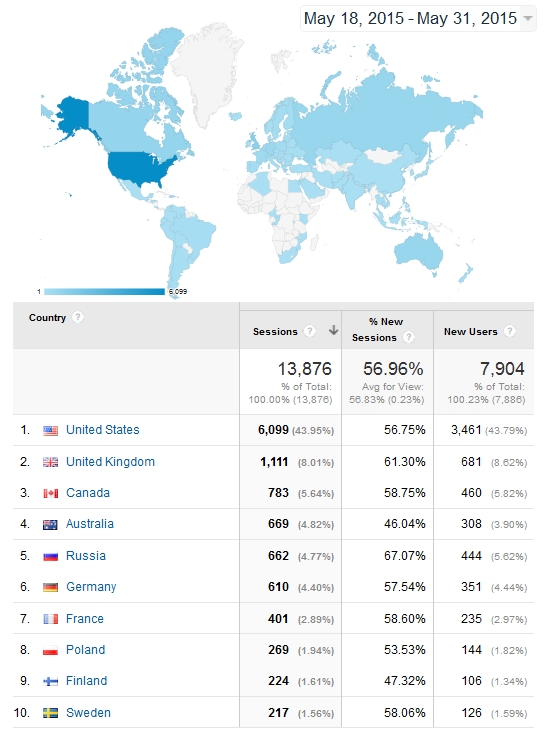
Cogmind Alpha Launch Stats (countries)
Naturally English-speaking countries top the list here. The UK percentage is slightly higher than usual for my site (it usually hovers around 5%)--the May value is most likely skewed because RPS is based in the UK.
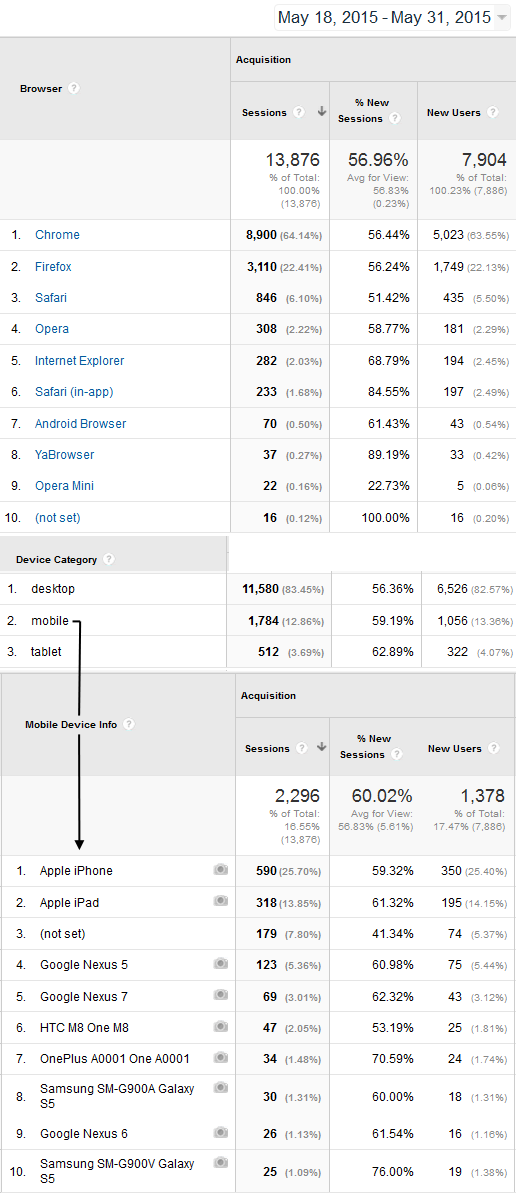
Cogmind Alpha Launch Stats (browsers and devices)
Browser and mobile device data.On both the initial launch day and the day RPS published its article it was exhilarating to watch the real-time website stats, which showed an average 30 visitors browsing at any given moment. On other days the number hovered around 5~10.
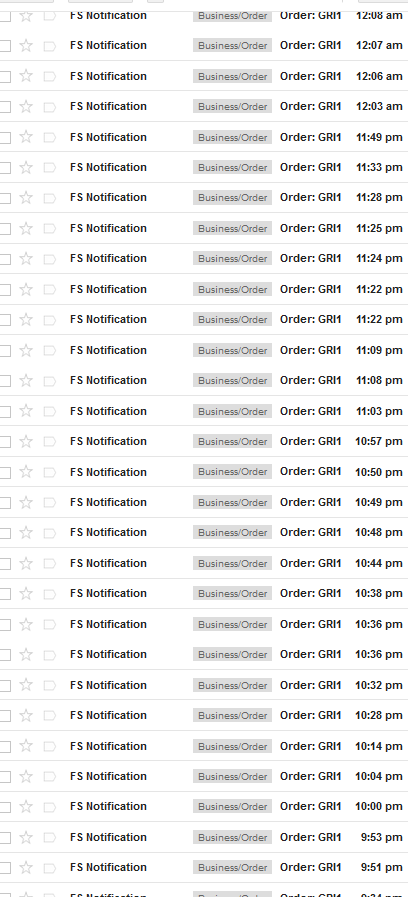
Cogmind Sales from RPS Article (excerpt)
Sales driven by the RPS article. As an indie developer releasing a first title, seeing an inbox that looks like this is one of the greatest feelings.This at least surmounted the first hurdle, proving that Cogmind is promising enough to convince new players to jump in, but the anxiety didn't quite end there.
What if they didn't like it?
Fortunately reception turned out to be overwhelmingly positive, for which I guess there wasn't much cause to worry since I'd already spent more than a year managing expectations through social media. (Later I'll be writing about specific marketing methods that were used to build and maintain the original audience.)
Of course not everyone visiting the website had heard of Cogmind before, so I did see a few voices of skepticism. The lack of media previews/reviews were no doubt keeping some prospective players from pulling the trigger. What we needed were some testimonials/quotes from real players. These happened to be piling up fast, so on the second day I collected some good ones and linked them directly from the Buy page:
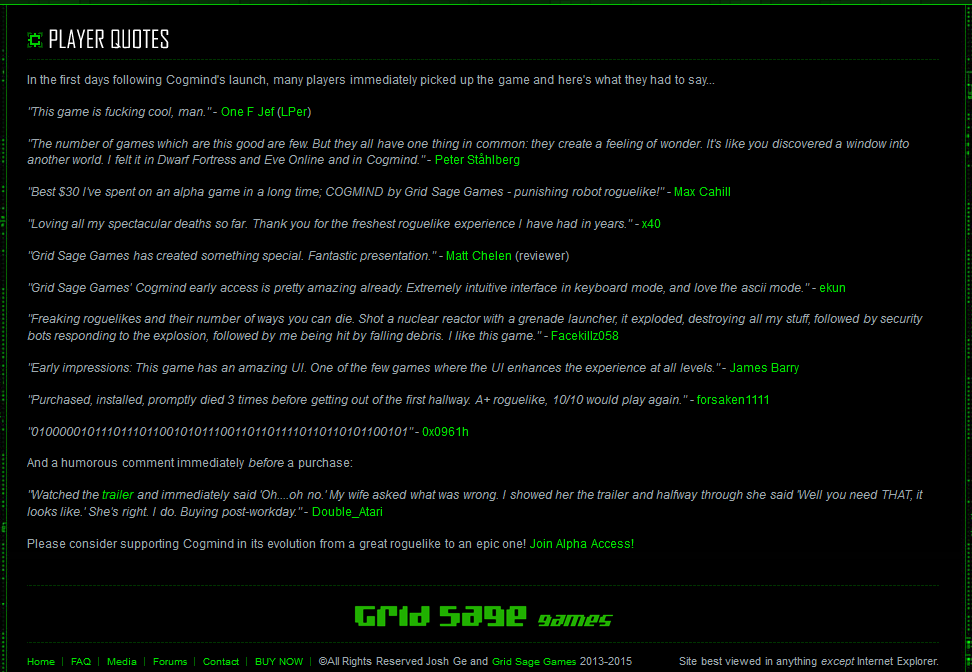
Cogmind Alpha Launch (quotes)
Cogmind: Early player quotes (click for full size).In the absence of official reviews (though several good LPs did begin popping up immediately after release), I'm certain the page of quotes helped convince* some players less familiar with the project that it was worth it, as did the long-running dev blog and to a lesser extent the newly active forums and subreddit for those who searched around. (*While I didn't do any A/B testing, I was watching GA and could see visitors going Buy page > Quotes > Buy.)
Throughout the first week I continued to update the Buy page with information and adjustments based on both direct feedback and discussions I was monitoring online. That combined with the many other pressing issues that popped up--troubleshooting for players with issues unique to their OS, finding temporary workarounds for a few bugs, basic marketing and promotion efforts (mostly by joining discussions as they appeared)--kept me busier than I've ever been for such a long period in my life.
For two weeks straight starting from a couple days prior to launch, I only managed to get 5~6 hours of sleep each day. Definitely not enough, but my sense of responsibility to the community and Cogmind itself kept me going. Several times I imagined how nice it would be to have a team with which to split up the never-ending list of tasks. I'm surprised I wasn't stopped in my tracks by sickness (that didn't happen until just after my schedule returned to normal--thank you, body).
It's also interesting to imagine how much different this experience must have been from releasing a game 20~30 years ago when social media and constant connectivity weren't even a thing. Sure as a developer today you still have the choice to ignore them, but that's ill advised given how beneficial monitoring and adjusting to reactions in real time is for any kind of marketing plan.
Part of the purpose behind Cogmind's soft launch was to teach myself what a commercial launch is like, and I believe it's achieved that goal. The full launch next year should be somewhat less hectic since I now have a clearer idea of what to expect and can plan accordingly. Of course there's also an established and growing community I can lean on in some regards, and for that I'm very thankful :)
The original release schedule determined in January 2015 put the release in April, but as we neared that date it was apparent Kacper's tileset wasn't going to be quite ready, plus I happened to get really sick for much of April, so it made sense to postpone it to May.
As far as marketing strategy goes, supposedly the second-to-last Tuesday in a given month is the best day to release a game, so I settled on May 19th. Pushing the date back several weeks gave plenty of time to perfect launch preparations and handle all the non-game parts of the plan--website, forums, payment system (that turned out to be rather complicated and took several days to get set up just right), etc. That worked well to keep me from getting overly stressed about the whole thing.
Seeing as I'm not the only one who reads up on marketing strategy, it should come as no surprise that launching with me that day were several other indie games and The Witcher 3... This would have been more worrisome if I was going for a general release, but as stated this launch was primarily aimed at the existing core fans who'd already been waiting for years. I'll be more careful about setting the 1.0 launch date.
Technically Cogmind was available for much of its audience (in the U.S.) on the evening of May 18th, equivalent to the morning of my 19th here in Asia, so I was a little ahead of those other games, too.
The close proximity of releases did result in some memorable moments, one in which someone asked to trade away Witcher 3 for Cogmind, and--while not related to release dates this was also interesting--someone else "honestly regretted having purchased GTA V instead of Cogmind." It's awesome to read stuff like that as an indie developer.
The most controversial aspect of Cogmind's alpha launch was the price. Charging for a traditional roguelike is already against the norm, much less launching an alpha at $30. However, the backlash was far less severe than I expected, with complaints in the minority and even individuals outside the regular fan base coming to my defense.
A humorous comment in response to the alpha trailer serves as a backdrop for a discussion on roguelike pricing: "Why is this not unfairly cheap like all other roguelikes? :P"
The roguelike community has long enjoyed the availability of sprawling highly replayable games with deep gameplay, all free of charge. These great games can be free because they're developed as hobby projects which can take as long as they need to reach maturity, while also having lighter asset requirements than most games.
Cogmind takes a different approach, reaching for a level of audiovisual polish never before seen in a traditional ASCII roguelike, at the same time shortening the "epic roguelike" development cycle from 6~10 years to "only" 3 years. Developing a quality game within a reasonable time frame requires a significant investment, one that members of an underserved niche community are apparently more than happy to support when a developer finally comes along to make the leap.
Thus it wasn't too surprising when a lot of roguelike fans expressed their confidence in the value of Cogmind. Some examples:
"Cogmind is the most beautiful and dynamic ASCII roguelike I have ever seen." --jason0320
"It's like seeing Doom the first time when everyone was stuck with Wolfenstein at best." --HRose
"I honestly believe this is one of the most fantastic games of any genre I have ever played." --biomatter
But among the dissenting voices I heard the comment "Only fanatics would pay a price like that." Fortunately...
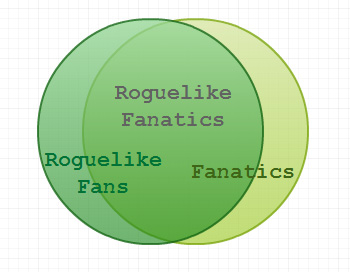
Roguelike Fanatics
Always know your target market demographics :)In a genre traditionally dominated by free games, one would naturally question the wisdom of selling a roguelike at a premium, even a high-quality one. However, roguelike fans have formed a healthy tight-knit community, one that is all too happy to see the genre expanded with modern games which still lean heavily on traditional elements. Not long after Cogmind's launch, another roguelike developer on Reddit (/u/chiguireitor) posted a poll to the core roguelike players community there (/r/roguelikes), and among the questions was one regarding payment. The results are enlightening:
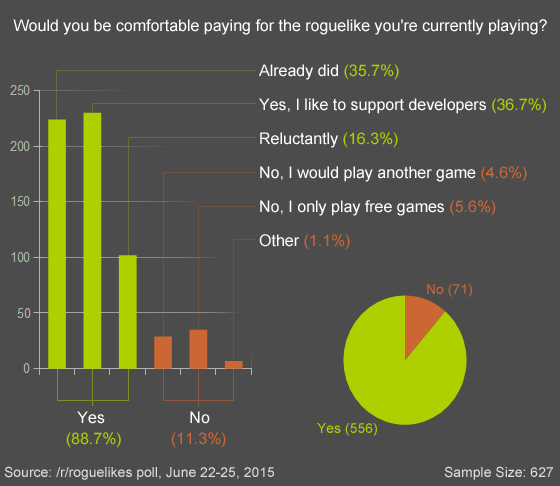
/r/roguelikes Roguelike Payment Poll Data
Payment tendencies among the roguelike community.We can't know the reasoning behind the "already did" buyers, since they could fall into either the "reluctant" or "supportive" categories, but taken together there is a respectable portion of the community willing to pay for a good roguelike. In any case, this partially explains the strong initial support for Cogmind despite the preponderance of free roguelikes.
Still, it's important to examine why I chose the price that I did at this stage.
First of all, I had originally considered a Kickstarter campaign, but it was both logistically problematic (not available in my country) and for Cogmind in particular I don't like the common types of backer rewards that either give up some element of creative freedom by allowing backers to decide game content itself, or provide extras that drain time and resources which could otherwise be devoted to game development.
While I didn't take that route, Cogmind's alpha release was still built around a crowdfunding model for which there is a precedent that alpha access costs around $20~30 in exchange for some additional perks beyond what future purchasers will receive. (In this case mostly taking the form of in-game credit.)
Quality niche games are also often priced in this range, and I believe Cogmind to be the epitome of both quality and niche. Certainly the price could start lower if the game appealed to a broader audience, but it's not the type of game that is likely to achieve broad popularity, nor does it strive to do that.
Games must be priced for their market, not some general "okay indie games average about $10 right now so this should be $10, too." Take a game like RimWorld, for example--a unique high-quality indie game that can afford to set a base price of $30 because no other game can offer the same experience.
Secondly, even if from an economic perspective we assume that a somewhat lower introductory price would result in greater total revenue (which at the right price point it almost certainly would), is that what we want right now, during alpha? Nope.
While the ultimate goal is to recover the full financial investment in Cogmind's development, and hopefully even generate profit that can be reinvested into future games, the current stage is more about interacting with the core community for whom the game is designed, not those who buy discounted games on a whim and may or may not ever even play them, or maybe play for a little while and probably complain that "it's too hard" (in the case of Cogmind, a punishing traditional roguelike) then give up, never to play again.
For the alpha I want quality players who are familiar with where Cogmind is coming from, who really care about Cogmind, or who've at least taken some time to educate themselves about the game given the wealth of information available online. Higher prices generally lead buyers to make an informed decision, and informed buyers are more often happy players.
Players who pay more are also much more likely to dig deeper into a game to discover what it has to offer, and like the roguelike classics before it Cogmind is a rewarding game to delve into...
In a general sense, when pricing a game with a fairly long open development cycle and plenty of room to grow, it makes sense to start at the higher end of what is acceptable to the target audience (assuming the initial state is a game already worth the price to that audience!). You can always lower the price over time, but raising it won't go over nearly as well.
During the alpha access campaign, because a number of visitors to the website are undoubtedly interested in Cogmind but turned off by the current price, they have the option to leave their email address instead. Prominently displaying this sign-up information on the Buy page both lets these potential players know Cogmind will be available for less next year and gives me a way to notify them when that happens--everyone wins! This was an excellent suggestion received shortly after launch, exemplifying another benefit of getting out there and engaging the potential audience and acting on their feedback where it makes sense.
My decisions here were all based on an analysis of current market conditions, my own objectives, and most importantly the characteristics of the game I'm selling. Every game must find its own price reasoning based on numerous relevant factors. Overall it took a couple months to settle on a model, and this after more than a year of observing the performance of other games.
Another obvious influence from the KS crowdfunding model is the idea of multiple "tiers."
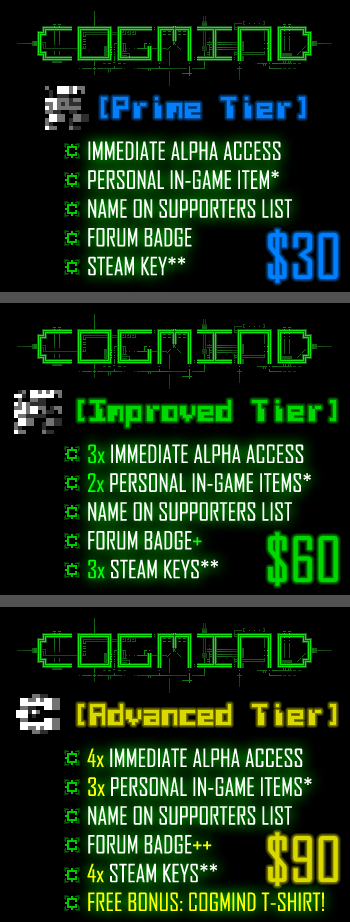
Cogmind Alpha Access Tiers
Cogmind Alpha Access TiersI didn't originally plan on having tiers, but prior to launch some fans expressed a desire to buy multiple copies which they could then gift to others, and naturally they'd appreciate a discount. So I decided to add a couple extra tiers, also throwing in a shirt I'd designed at the highest tier. (At first I intended to offer the t-shirt with a copy of the game for an extra fee, but the payment processor said I couldn't sell physical products that didn't ship immediately, so I got creative and instead made it a "free bonus" at the highest tier.)
The package tier approach turned out to have some unexpected benefits.
Some players not interested enough to support Cogmind at the $30 alpha price saw the buy-three-for-the-price-of-two intermediate tier as a way to get alpha access at 33% off--all they needed was to find two other buyers. Many of these groups formed organically via their forum/social media of choice, i.e. free marketing. (Even as I write this post, two separate individuals on Twitter are introducing the game to their followers and asking if anyone wants to join them.)
Part of the problem with Cogmind's introductory price is that I call it an early access "alpha," eliciting understandable knee-jerk reactions of "Alpha =/= $30."
Fortunately long-time followers are well aware of the years of open development behind the game already, and know it to be far more complete than what might normally be dubbed an alpha.
At launch Cogmind could easily have been considered a beta release, but then I don't want players to judge it as nearing completion because the goal is much more epic. In roguelike tradition there's plenty of game to enjoy already, and it's fun with an extremely low bug-to-content ratio, but development will continue for up to a year.
At the same time, while I will always stay true to my vision for Cogmind, there's no doubt that current players will help define some aspects of the final game, either directly or indirectly, and that, too, is meaningful and valuable to them as early access participants.
Given the somewhat controversial price and low external exposure, the most important question is: Did it work? The answer is yes, so far.
I remember thinking before launch... okay, we currently have about 650 items that can be claimed via the alpha access campaign tiers--I'll be happy if those trickle away throughout the remainder of alpha development. Gone in a week and a half.
I was pretty shocked. It's an "alpha," after all, and my first commercial release.
Impressive, but taking a serious look at the numbers we still have quite a ways to go. Since picking up the Cogmind prototype in June 2013, I've invested approximately $43k USD into development (all costs included). After taxes and fees about half of that has been recovered so far, and now we already find ourselves heading into the infamous long tail, which will likely (hopefully) transform into the stegosaurus tail at some point, especially once we reach 1.0 with a much bigger launch and broader marketing effort.
The good news is, thanks to generous alpha supporters I'm confident we can expand the total budget and reinvest this initial sum to realize the best version of my complete vision for Cogmind! A huge thanks to everyone who's made this possible :D.
Cogmind's recalculated total budget from zero to 1.0 now lies somewhere around $70k. We'll see how accurate that is next year...
In summary, is this performance good for an indie traditional roguelike? Hell yeah!
Is it a lot of money? Well, no :(. It's a pittance for two years of full-time work--a regular day job would blow this away, but there is hope and it's rewarding to (for now) be able to continue creating something that myself and others love! Let's hope this becomes a sustainable trend. Traditional roguelikes require so much work that I don't know how smart it is to do this as a commercial endeavor, but at least the result is a high-quality game that can be delivered in a relatively short period.
Now let's look at a few graphs.
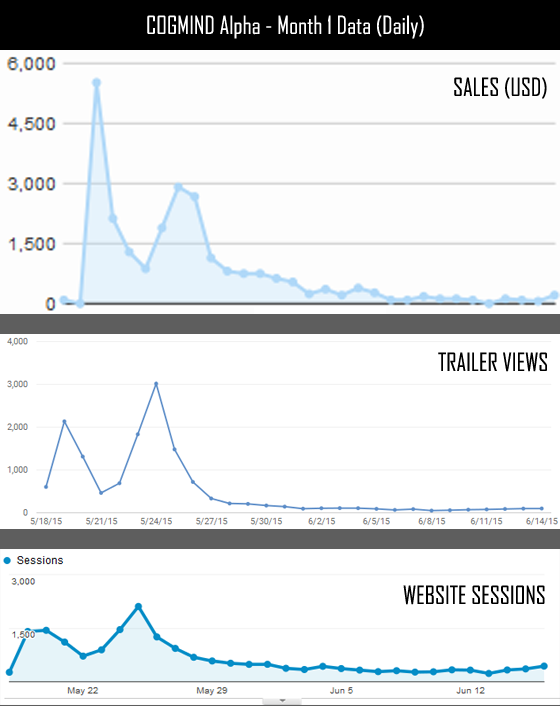
Cogmind Alpha Launch Sales Data (Month 1)
Cogmind Alpha Launch Sales Data, Month 1.For the alpha launch, since there were two primary sources of buyers as discussed earlier, we're in an interesting position to compare the reaction to the game between the core audience (long-time fans and roguelike enthusiasts) vs. a general indie PC audience (RPS etc.).
Notice the sales peaks are reversed compared to the trailer/website peaks.
The first spike is an immediate rush by fans to get Cogmind on day one. Yay! Conversion rates are impressive here, but don't mean much there when you have a pool of people waiting to watch the trailer and jump on the website solely to buy the game. Incredibly steep slopes on that first sales spike reflect the fact that it was mostly composed of dedicated followers. Cogmind wasn't even announced anywhere else in those first few days.
Then RPS published their announcement (and a few smaller sites naturally pick up the news from there), followed by another surge in sales, surprising considering a large portion of RPS readers had never heard of Cogmind or were not necessarily interested in traditional roguelikes. Judging based purely on the first two days of sales from each source, the ratio of buys by RPS readers visiting the site and/or watching the trailer was nearly half that of the core fans, despite the high price. This bodes well for when Cogmind is completed and launched on a larger scale.
Note: More stats specific to trailer views can be seen in the trailer post-mortem.
Every post-mortem needs a section like this. The old "What would I do differently?"
Here I'm happy to say almost nothing.
Certainly I would want a more clearly designed Buy page, kinda like what it started out as on day one, instead of the hodgepodge of notices and even flashing text (yep, I went that far) that it became after days of tweaks to address different issues.
I would've also liked to have that "email notification sign-up" ready from day one as well--adding it only after a day or so missed the initial surge of visitors, some of whom would've signed up. At least I know that most of those visitors are roguelike community regulars, so they'll probably hear about Cogmind through regular channels, anyway.
Unrealistically, releasing six months to a year earlier would've been nicer since the advent of VAT in 2015 had a pretty huge effect on prices for European players--there would've been more, and they would've been happier, if the high price wasn't pushed yet higher by such a massive tax rate.
All said I think the launch went really well, and the main reason for that is everything was planned out well in advance. It was hectic, but only in terms of there always being more to do than I had time for, so I repeatedly adjusted my TODO list as necessary to make sure any high-priority items were taken care of. I lived with that list in my face for two weeks, and interestingly, some things I'd planned to do "later on launch day" were literally pushed back more than a week as more pressing issues were inserted.
Anyway, the point is make a list, frequently skim it to ensure it's prioritized, and knock things off the top one by one.
Having successfully transitioned from private development to a public launch with an engaged and satisfied community, it's time to look towards the real beta/1.0. Up to a year of additional work will yield the full story and cast of NPCs, many more maps and some new parts and mechanics, more ambient sound effects, music... While I could crank out 1.0 by the end of the year on my own, having an active community in the foreground will slow that down a bit, and the final version will be better for it. No sense in rushing it as long as we have steady progress and (generally) a new release every month.
In terms of the business plan, while I aim to eventually put Cogmind on Steam for access to a broader market, that time is not now. Aside from that being a different audience for which the game is not quite ready, financially speaking it's nice to start off with as many direct sales as possible so that most of the funding makes it to me--money that can go into development rather than fattening the coffers at some corporation. Think of the money that would have been lost from those charts above (and all the sales since) if I'd started out in Steam. Yes volume will more than make up for it, but that's for a later time. In related news, five weeks after launch GOG contacted me about releasing through them... No rush, but it's nice to be recognized.
I hope you enjoyed this bit of inside data. Expect another post-mortem with many more figures and comparative analysis after we launch 1.0. Since the beginning of development I've also been collecting detailed time management stats that will explain where I've allocated that most valuable of resources, but that's for a separate future analysis.
(This article was originally published here, on the Grid Sage Games dev blog.)
Read more about:
Featured BlogsYou May Also Like